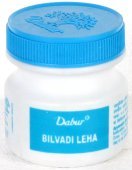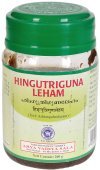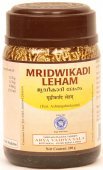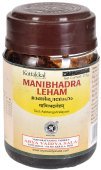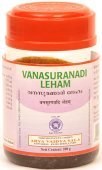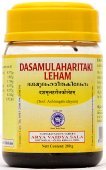Leha, Lēha: 15 definitions
Introduction:
Leha means something in Hinduism, Sanskrit, Marathi, Jainism, Prakrit. If you want to know the exact meaning, history, etymology or English translation of this term then check out the descriptions on this page. Add your comment or reference to a book if you want to contribute to this summary article.
In Hinduism
Ayurveda (science of life)
Kalpa (Formulas, Drug prescriptions and other Medicinal preparations)
Source: Shodhganga: Edition translation and critical study of yogasarasamgrahaLeha (लेह, “linctus”) is a Sanskrit technical term appearing in the 15th-century Yogasārasaṅgraha (Yogasara-saṅgraha) by Vāsudeva..—Leha (linctus) is a typical Ayurvedic preparation, which is heavy in nature. It is the extract preparations (the first five mentioned) that are boiled down to consistence. Rasakriyā and avaleha are its other names. For preparing leha, the mentioned drugs are decoctioned and to this jaggary or sugar and the paste (if mentioned) are mixed. It is cooked in slow fire. When it becomes semi solid, the powdered drugs, ghee, oil etc can be added. As sugar agents, ghee etc are added it is rejuvenating and bulk promoting.
Unclassified Ayurveda definitions
Source: gurumukhi.ru: Ayurveda glossary of termsLeha (लेह):—[lehaḥ] It means the preparation of the medicines topically in palatable form (in the form of linctus) given for licking.

Āyurveda (आयुर्वेद, ayurveda) is a branch of Indian science dealing with medicine, herbalism, taxology, anatomy, surgery, alchemy and related topics. Traditional practice of Āyurveda in ancient India dates back to at least the first millenium BC. Literature is commonly written in Sanskrit using various poetic metres.
Jyotisha (astronomy and astrology)
Source: Wisdom Library: Brihat Samhita by VarahamihiraLeha (लेह) (or Lehagata, Lehagrāsa) refers to one of the ten types of (solar and lunar) eclipses (grāsa), according to the Bṛhatsaṃhitā (chapter 5), an encyclopedic Sanskrit work written by Varāhamihira mainly focusing on the science of ancient Indian astronomy astronomy (Jyotiṣa).—Accordingly, “If the solar or lunar disc should be just dimmed by darkness all round which disappears immediately, the eclipse is technically known as Leha (licking): all creatures will be happy and the earth will be flooded with water. If a third, or a fourth, or one half of the disc should be eclipsed, it is technically known as Grasana (seizing with the mouth) grasa—partial eclipse: the wealth of prosperous princes will suffer diminution and prosperous countries will be afflicted with calamities”.

Jyotisha (ज्योतिष, jyotiṣa or jyotish) refers to ‘astronomy’ or “Vedic astrology” and represents the fifth of the six Vedangas (additional sciences to be studied along with the Vedas). Jyotisha concerns itself with the study and prediction of the movements of celestial bodies, in order to calculate the auspicious time for rituals and ceremonies.
Languages of India and abroad
Marathi-English dictionary
Source: DDSA: The Molesworth Marathi and English Dictionarylēha (लेह).—m S A medicine to be taken by licking; a lambative or linctus, a bolus, an electuary.
Source: DDSA: The Aryabhusan school dictionary, Marathi-Englishlēha (लेह).—m A medicine to be taken by licking; a linctus.
Marathi is an Indo-European language having over 70 million native speakers people in (predominantly) Maharashtra India. Marathi, like many other Indo-Aryan languages, evolved from early forms of Prakrit, which itself is a subset of Sanskrit, one of the most ancient languages of the world.
Sanskrit dictionary
Source: DDSA: The practical Sanskrit-English dictionaryLeha (लेह).—[lih-ghañ]
1) Licking, sipper; as in मधुनो लेहः (madhuno lehaḥ) Bk. 6.82.
2) Tasting.
3) A lambative, an electuary.
4) Food.
5) One of the ten ways in which an eclipse occurs; Bṛ. S.
-hī A disease of the tips of the ears.
Derivable forms: lehaḥ (लेहः).
Source: Cologne Digital Sanskrit Dictionaries: Shabda-Sagara Sanskrit-English DictionaryLeha (लेह).—m.
(-haḥ) 1. Food. 2. Licking, tasting. E. lih to taste, aff. ghaña .
Source: Cologne Digital Sanskrit Dictionaries: Cappeller Sanskrit-English DictionaryLeha (लेह).—[masculine] licker, sipper.
Source: Cologne Digital Sanskrit Dictionaries: Monier-Williams Sanskrit-English Dictionary1) Leha (लेह):—[from lih] a m. one who licks, a licker, sipper (madhuno lehaḥ, ‘sipper of honey’, a bee), [Bhaṭṭi-kāvya]
2) [v.s. ...] anything to be taken by licking or sipping or sucking, an electuary, syrup, [Suśruta]
3) [v.s. ...] food, [cf. Lexicographers, esp. such as amarasiṃha, halāyudha, hemacandra, etc.]
4) [v.s. ...] Name of one of the 10 ways in which an eclipse can take place, [Varāha-mihira’s Bṛhat-saṃhitā]
5) b lehana etc. See p. 903, col. 1.
Source: Cologne Digital Sanskrit Dictionaries: Yates Sanskrit-English DictionaryLeha (लेह):—(haḥ) 1. m. Food; licking.
Source: DDSA: Paia-sadda-mahannavo; a comprehensive Prakrit Hindi dictionary (S)Leha (लेह) in the Sanskrit language is related to the Prakrit word: Leha.
[Sanskrit to German]
Sanskrit, also spelled संस्कृतम् (saṃskṛtam), is an ancient language of India commonly seen as the grandmother of the Indo-European language family (even English!). Closely allied with Prakrit and Pali, Sanskrit is more exhaustive in both grammar and terms and has the most extensive collection of literature in the world, greatly surpassing its sister-languages Greek and Latin.
Prakrit-English dictionary
Source: DDSA: Paia-sadda-mahannavo; a comprehensive Prakrit Hindi dictionary1) Leha (लेह) in the Prakrit language is related to the Sanskrit word: Leha.
2) Leha (लेह) also relates to the Sanskrit word: Lekha.
Prakrit is an ancient language closely associated with both Pali and Sanskrit. Jain literature is often composed in this language or sub-dialects, such as the Agamas and their commentaries which are written in Ardhamagadhi and Maharashtri Prakrit. The earliest extant texts can be dated to as early as the 4th century BCE although core portions might be older.
Kannada-English dictionary
Source: Alar: Kannada-English corpusLēha (ಲೇಹ):—
1) [noun] the act of licking.
2) [noun] anything that is to be taken by licking.
3) [noun] a medicine made by mixing drugs with honey or syrup to form a paste, which is to consumed by licking.
Kannada is a Dravidian language (as opposed to the Indo-European language family) mainly spoken in the southwestern region of India.
See also (Relevant definitions)
Starts with: Lehacintamani, Lehagata, Lehagrasa, Lehaja, Lehaka, Lehala, Leham, Lehamgai, Lehana, Lehanem, Lehanga, Lehani, Lehaniya, Lehann, Lehapha, Lehapishta, Leharasoana, Lehari, Lehasrishta, Lehati.
Ends with (+11): Aleha, Ashtangavaleha, Avaleha, Balleha, Bhalleha, Bilvavaleha, Calleha, Celleha, Colleha, Duppadileha, Gokshuravaleha, Holleha, Jolleha, Kaduselleha, Kushavaleha, Madanakameshvarileha, Madhuleha, Madhunoleha, Maleha, Padileha.
Full-text (+34): Leham, Avaleha, Madhuleha, Lehacintamani, Kshiraleham, Matunolekam, Matulekam, Madhunoleha, Lekam, Praleha, Lekha, Madhunoliha, Lehi, Avalehika, Rasaleha, Leh, Rasakriya, Prakshepa, Lehagrasa, Lehagata.
Relevant text
Search found 7 books and stories containing Leha, Lēha, Lehā, Lēhā; (plurals include: Lehas, Lēhas, Lehās, Lēhās). You can also click to the full overview containing English textual excerpts. Below are direct links for the most relevant articles:
Chaitanya Bhagavata (by Bhumipati Dāsa)
Verse 1.10.85 < [Chapter 10 - Marriage with Śrī Lakṣmīpriyā]
Verse 3.4.457 < [Chapter 4 - Descriptions of Śrī Acyutānanda’s Pastimes and the Worship of Śrī Mādhavendra]
Atharvaveda and Charaka Samhita (by Laxmi Maji)
Kṣārapāṇi (Āyurveda scholar) < [Chapter 1 - Introduction]
Kāsa (bronchitis) according to Caraka < [Chapter 4 - Diseases and Remedial measures (described in Caraka-saṃhitā)]
Viṣa (poison) according to Caraka < [Chapter 4 - Diseases and Remedial measures (described in Caraka-saṃhitā)]
Sushruta Samhita, Volume 6: Uttara-tantra (by Kaviraj Kunja Lal Bhishagratna)
Chapter LII - Symptoms and Treatment of Cough (Kasa) < [Canto III - Kaya-chikitsa-tantra (internal medicine)]
Sushruta Samhita, volume 4: Cikitsasthana (by Kaviraj Kunja Lal Bhishagratna)
Chapter X - The medical treatment of major cutaneous affections
Chapter XXXIV - The injudicious use of emetics and purgatives
The Agni Purana (by N. Gangadharan)
Brihat Samhita (by N. Chidambaram Iyer)
Related products
(+12 more products available)
